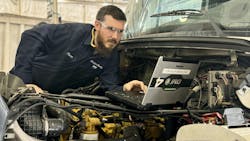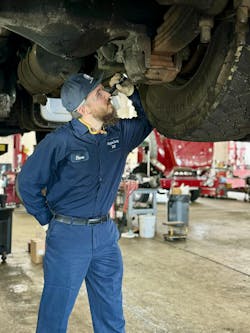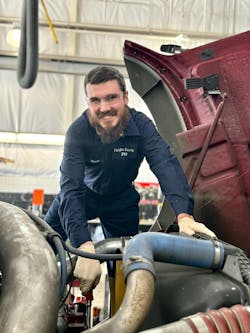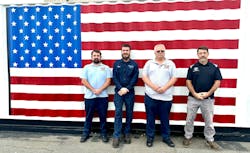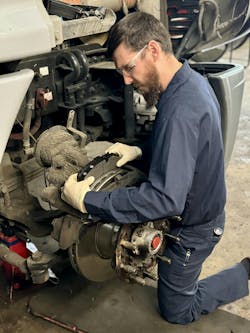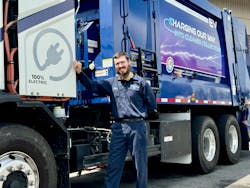When Steve Mancuso was young, he was one of those kids who liked to disassemble things to see how they worked.
“I was always pretty mechanically inclined as a kid,” he says. He remembers going to yard sales and buying parts for his BMX bike and taking apart remote-controlled cars. And occasionally, his parents would find the television’s remote control in pieces.
“I would drive my parents crazy.”
At some point during high school an idea popped into Mancuso’s mind: “If I enjoy doing this, maybe I’ll make a career out of it.”
And Mancuso has done just that. The freshly minted 35-year-old has worked as a technician in a Ford dealership and for independent shops, but he’s found his professional groove since joining the Department of Vehicle Services for Fairfax County, Virginia, in 2018.
He achieved World Class Technician status in 2021 with the National Institute for Automotive Service Excellence (ASE) and has been promoted to Fairfax County’s highest level for technicians. He’s a go-to diagnostic technician who also serves as a trainer and mentor to his peers. And now he can add another achievement and exclusive patch to his sleeve: Motor Age's 2024 Best Young Tech.
Feeding Off the Variety
Mancuso has had to find his own way into the field, because he says his high school didn’t have an automotive program. After earning his high school diploma he attended Universal Technical Institute in Exton, Pa., and completed his automotive technology certificate with honors in 2009. His first job was as a helper at a Ford dealership, and he worked his way up to lead technician. That’s also where he started working on diesel engines. After some time with independent shops, he realized he was looking for something a little different.
He prefers variety, and found he really enjoyed worked on heavy-duty equipment. That led him to a municipality.
“When I started I wasn’t really sure what to expect,” he says. “It really varies. You don’t work on the same thing every day. One day you could be working on a generator or a welder and the next day you’re working on a tractor trailer. It’s really varied work.”
The Department of Vehicle Services maintains and services more than 6,300 vehicles — everything from school buses and trash collection trucks to vacuum trucks for wastewater and stormwater and pickups for the park department.
“There’s just so many different vehicles that come through our shop — it’s crazy,” he says.
“I kind of like the fast pace of the dealership world, but you’re just working on the same stuff every day. You can get really good at working on one thing, but (here), you’re working on 20 different things. To me, it’s a lot more interesting. It’s fun. It’s challenging and I really don’t have anything bad to say about it.”
Focusing on Training
Mancuso joined his department as a level one technician, and within three years had moved up two more notches to the department’s highest technical spot: vehicle and equipment technician 3.
In nominating Mancuso, Long “Teddy” Lai, fleet service and facility manager, said he “consistently performs at a high level. He is often seen diagnosing and repairing complex components in our fleet of trucks. He is always willing to take on tough assignments, help his team with difficult tasks, and strongly desires to exceed expectations.”
In the last year Mancuso has added safety trainer to his list. He’s developed and conducted training sessions on fall protection, uniform and personal protective equipment, lockout tagout and heat stress.
Mancuso says he’s also added technical training sessions to fill in gaps when the department’s budget has constrained outside training resources. He says the training has been designed with new, young technicians in mind who are getting to know the equipment that rolls into their service bays. Sessions have covered things like hydraulics, air brakes, and different electrical systems.
“It really helps the young guys get up to speed as far as what we work on day-to-day,” Mancuso says.
The in-house lessons complement what other vendors, including truck manufacturers, offer.
“Eaton, for example, makes transmissions, and the area representative will come in and go over some of the more technical things with the transmission — how they operate, (common) problems and how to go about (fixing) those issues. And with the trash truck, you’ll have stuff that’s pretty complex with the body and all the hydraulics and all the electronics that have to work together and coexist,” he says.
“There was a need we saw, and we just put some stuff together in house (to) make our guys better and also safer.”
Becoming World Class
Mancuso is one of about 2,300 technicians to achieve World Class status from ASE since the program began in 1986. He earned his initial ASE certifications while a student at UTI, but then when he joined the Ford dealership, training there was centered on Ford’s technical credentials, so ASE certifications took a back seat.
“Once you get outside of (the dealership) box, the rest of the industry — everybody else — recognizes ASE,” Mancuso says.
He remembers a day when one of his coworkers at the county shop was talking about the World Class recognition. In a light bulb moment he thought, “I can probably do that.
“So I started taking the tests,” and as it turned out, others in the Department of Vehicle Services chose to do the same. Ultimately, four of them earned World Class status around the same time. (Mancuso completed his testing in 2020 and was named a World Class Tech in early 2021 when he was 31 years old.)
ASE hasn’t maintained official statistics of the ages of technicians when they achieve World Class status, but a spokeswoman estimated that most achieve the mark in their 30s and 40s.
Finding His Passion
Mancuso is well versed in the worries that surround a shortage of technicians and a general lack of young people entering the trade. He doesn’t see a one-size-fits-all solution.
“There’s not just one problem in the industry with the technician shortage. I think it’s a few things.
“Some of it is, kids at high school really aren’t getting pushed to that because they’re not being exposed to the trades. And another thing is, when new guys are just coming in (to the industry,) it’s tough because you’re not getting paid a lot of money and you’ve got to buy a lot of tools.
“Also, the complexity of things nowadays, it really can be overwhelming. So if you’re not really committed to learning new things, buying tools and really buckling down, guys just move on and do something else.”
So if he could wave a magical wrench and fix this problem, what would Mancuso do?
“Bring back the vo-tech” and other hands-on training sessions in high schools. “I think that would definitely help.”
As for the technical side of things, Mancuso says there’s no simple fix. Vehicles are complex and he admits it’s just bound to be tough initially. “It can be discouraging.”
But that again is where he thinks exposure in high school is critical.
“With a lot of older guys retiring, they take that knowledge with them, and if there aren’t people to pick up their knowledge, it really leaves a big gap.”
Bridging that gap “isn’t simple, and (involves) a lot of moving parts,” he says.
He sees the gap in his own workplace, and after having the opportunity to participate in some panel interviews with job candidates, he also sees some of what is missing.
“A lot of guys I feel like aren’t really passionate about being a mechanic. They just do it for the money. I don’t really think that helps the situation,” Mancuso says.
If he was tasked with recruiting, he says he’d stress the variety and the opportunity to constantly learn and try new things.
“It’s not the same thing every day. If you enjoy learning new things and you’re not afraid to get dirty, it’s really fun — and you can learn how to work on your own stuff,” whether that’s a hot rod or vehicle for off-roading.
“The biggest thing is having passion. If you’re not passionate about doing something, it’s hard to do it.”
Playing Detective
The passion is how Mancuso got hooked. Over time he’s advanced from doing typical maintenance and repair tasks to solving diagnostic mysteries.
“A lot of times what will happen is, I’ll start working on something and then somebody else will come to me for help. Then I’ll start working on their truck with them, helping them figure something out. I’ll never get my work done, but I’ll help somebody else finish theirs.”
He says that describes the majority of his workdays.
“To me, that’s the most fun — taking a bunch of pieces (of information) and then coming to something that you can just figure out — you get the big picture,” he says. “You get to use your brain. It’s not just pulling out a drain plug and draining the oil. It’s challenging.”
Occasionally the diagnostic mysteries are even more complex when they appear on a vehicle he hasn’t serviced previously.
“One day I’ll be working on something I’m familiar with and then the next day it’s something kind of alien to me.”
He remembers a truck that needed an engine harness. Someone else in the shop had put the harness on, but eventually the team realized the pins on the ECU connector were incorrect. He says it was a tedious yet satisfying project to reassemble that correctly.
It was like “playing detective and figure out what goes where.”
Sometimes that detective work is needed on more than just vehicles, but equipment in the shop. His boss Lai recalls Mancuso’s touch on a parts elevator that was built in 1988 — a year before Mancuso was born.
The elevator is used to lift heavy engine parts to an upper storage area in the shop’s parts department. Three vendors had all taken a turn at it, and the county had paid them a combined $5,000 only to end up with a still-broken elevator.
Mancuso happened to be in the office area when Lai and others were talking about what to do next. The elevator had been out of commission for more than a year. Mancuso asked, “Do you mind if I take a look?”
He got the OK and spent a few hours assessing the elevator. He even called in his brother, who is an electrician, for some assistance.
“There was some electrical work, like the building’s electric that I had to work through…and then there’s some hydraulics on the elevator that I had to figure out,” he says. “I spent a few hours on it and figured out what did what and eventually figured out the problem, and now it’s working again.”
He admits the elevator “was completely out of my wheelhouse.”
Lai says Mancuso’s fix saved the county more than $300,000 — the cost to replace the elevator — which was thought to be the only solution.
He’s “always prepared to take on even the most challenging and dirtiest tasks in the facility without hesitation. It’s important to note that we maintain refuse loaders and compactors with highly sophisticated hydraulic systems. These trucks are difficult to maintain, and when you add waste and trash into the mix, the work becomes hazardous.”
Lai says Mancuso has built a reputation as a reliable and principled employee. “He has demonstrated a consistent dedication to ensuring that tasks are executed with precision and correctness from their inception,” and has developed expertise in the maintenance and repair of tractors, trailers, and refuse trucks.
Just as important, Lai says Mancuso “places a high value on collaborative efforts and takes responsibility for his actions.” He’s dependable and willing to help lower-level technicians, too. “He is continuously relied upon to tackle repairs, no matter the complexity or the availability of technical information.”
Mancuso says, “I like figuring it out. Solving problems is just fun for me.”
Someday, he says he might want to move up into management. But for now, he’s happy troubleshooting and fixing problems in a service bay.
“I think eventually I’ll probably move into management, but to be completely honest, my heart is really in the shop.”
Prize Package
Steve Mancuso, winner of the 2024 Best Young Tech Award, will receive this prize pack from Motor Age and the contest's sponsors:
- All expenses paid trip for two to the 2024 AAPEX/SEMA Show in Las Vegas, provided by Motor Age magazine.
- A complimentary ALLDATA subscription for 12 months, provided by Duralast Parts
- A $1,500 tool credit, provided by Nexpart
- ASE A-Series and T-Series study guides, provided by Motor Age Training
- Haynes Model V8 Engine, provided by TechForce Foundation
- Award plaque and uniform patch
Best Young Tech Remains an Automotive Student
Steve Mancuso has amassed an impressive resume of trainings and certifications as a young technician, including:
- ASE World Class Technician
- ASE Master Certification in Automotive, Collision Repair, Truck Equipment, Transit Bus, SchoolBus, Medium-Heavy Truck, Military Tactical Wheeled Vehicle, Advanced Engine Performance Specialist L1, Electronic Diesel Engine Diagnosis Specialist L2, EV Technician, and Parts Specialist.
- Virginia State Vehicle Safety Inspector
- IMI International Level 3 certification in Electrical/Hybrid Vehicle System Repair and Replacement
- Tire Industry Association certified trainer
About the Author
Joy Kopcha
Managing Editor | Motor Age
Joy Kopcha joined Modern Tire Dealer and Auto Service Professional as senior editor in 2014 after working as a newspaper reporter for a dozen years in Kansas, Indiana and Pennsylvania. She was named managing editor of MTD and ASP in 2022, and took on that same role with Motor Age in 2024.
She is an award-winning journalist, including in 2023 when she was named a Jesse H. Neal Awards Finalist.
Don't miss any of her articles. Sign up for Motor Age newsletters.
